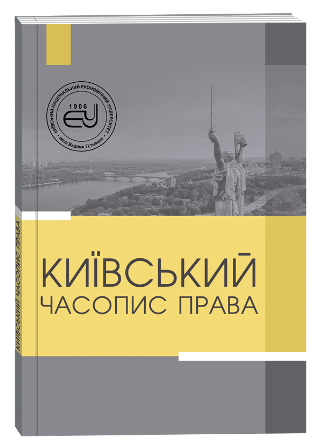TAX RESIDENCY OF REFUGEES: LEGAL CONFLICTS AND PRACTICAL CHALLENGES IN THE TERMS OF INTERNATIONAL TAXATION STANDARDS AND NATIONAL LEGISLATION
DOI:
https://doi.org/10.32782/klj/2025.1.7Keywords:
tax residency, double taxation, financial obligations, refugees, tax policy, international standards, human rights, legal statusAbstract
The article analyzes the current issue of the tax residency of refugees in the context of global migration flows and the growing number of forcibly displaced persons. The author turns to an understudied field, the study of which consists in a comprehensive approach to the consideration of the tax status of refugees, in particular, in the interaction of international and national legislation and their shortcomings in regulating the tax obligations of this category of persons. The work has significant scientific value due to the well-founded analysis of international tax standards (MLI and CRS) and their impact on national approaches to determining tax status.The author carries out a critical review and analysis of legal acts and examines in detail the practical problems arising from the imperfection of legislation in the field of tax residency of refugees. This approach makes it possible to comprehensively cover the problem and show why the modern tax system needs adaptation to ensure the rights of refugees. In addition, the paper analyzes double taxation and the risks of tax liabilities in several jurisdictions, which creates an additional financial burden on refugees and violates the principles of justice and equality.The article offers specific ways to solve the problem of double taxation for refugees, and also suggests possible ways of adapting national tax laws to take into account the specifics of the status of the specified category of persons. These recommendations have practical applications in the process of developing tax policy, and also contribute to increasing the effectiveness of international cooperation in the tax field.In addition, the author focuses on the mechanisms of harmonizing tax legislation across different countries to account for the interests of refugees. Specifically, emphasis is placed on the need to revise the criteria for tax residency, such as the place of permanent residence, economic interests, and the duration of stay in a specific jurisdiction. The author notes that existing approaches often disregard the unique circumstances faced by refugees, leading to their discrimination in tax relations.The paper also highlights issues of international cooperation between countries regarding the exchange of information on the tax status of individuals in the context of international standards. The author emphasizes that the implementation of such instruments as the Multilateral Instrument (MLI) and the Common Reporting Standard (CRS) requires additional adaptation to ensure transparency and fairness concerning refugees. The issue of protecting the personal data of these individuals is also examined, as its transfer between jurisdictions may pose risks to their safety.The author underscores that addressing the issue of tax residency for refugees demands an interdisciplinary approach that encompasses not only legal aspects but also socio-economic analysis and the consideration of humanitarian factors. Such an approach allows for the reduction of double taxation risks and the creation of a more flexible system that takes into account the specific circumstances of refugees, thereby facilitating their integration into new societies.
References
Церковний О. В. Правове регулювання резидентства платників податків : автореф. дис. … канд. юрид. наук : 12.00.07 / О. В. Церковний ; кер. роботи С. Є. Федоров ; Нац. юрид. ун-т ім. Ярослава Мудрого. Харків, 2017. 20 с. URL: https://dspace.nlu.edu.ua/bitstream/123456789/12585/1/Tserkovnyy_2017.pdf
Податковий кодекс України від 2 грудня 2010 року № 2755 (зі змінами та доповненнями). URL: http://zakon2.rada.gov.ua/laws/show/2755-17
United Nations Double Taxation Convention between Developed and Developing Countries 2017 Update, New York. URL: https://www.un.org/esa/ffd/wp-content/uploads/2018/05/MDT_2017.pdf
Закон України «Про біженців та осіб, які потребують додаткового або тимчасового захисту» від 08.07.2011 № 3671-VI (зі змінами та доповненнями). URL: https://zakon.rada.gov.ua/laws/show/3671-17#n9
Свящук Л.А. Проблеми прав біженців та виклики сучасності. Навчальний посібник. Міністерство освіти та науки України. Харків. 2018 рік. 321 с. URL: https://nlu.edu.ua/wp-content/uploads/2021/05/ phd_2_copy.pdf
Городніченко Ю.В. Подвійне оподаткування: його сутність та проблеми усунення. Мукачівський державний університет. Гроші, фінанси і кредит. Економіка і суспільство. Випуск № 10/2017. С. 574-578. URL: https://economyandsociety.in.ua/journals/10_ukr/99.pdf
Биков І.О. Еволюція національної податкової системи в контексті наближення податкового законодавства України до стандартів Європейського Союзу. Юридичний науковий електронний журнал. 2023. № 10. С. 671 – 673. URL: https://doi.org/10.32782/2524-0374/2023-10/162
Биков І.О. Українська митниця та стандарти ЄС (адміністративно-правове дослідження): монографія / І. О. Биков. Одеса : Видавництво «Юридика», 2023. 224 с. URL:https://oduvs.edu.ua/uploads/ Monografiya_Bikov_Igor_82b56aa11b.pdf







